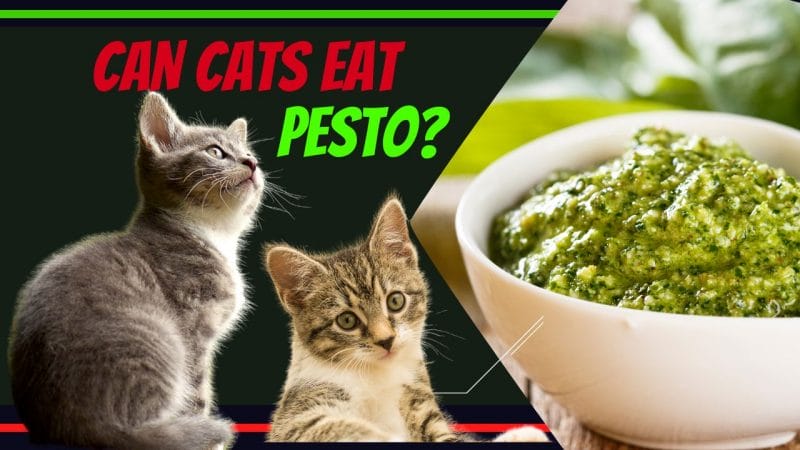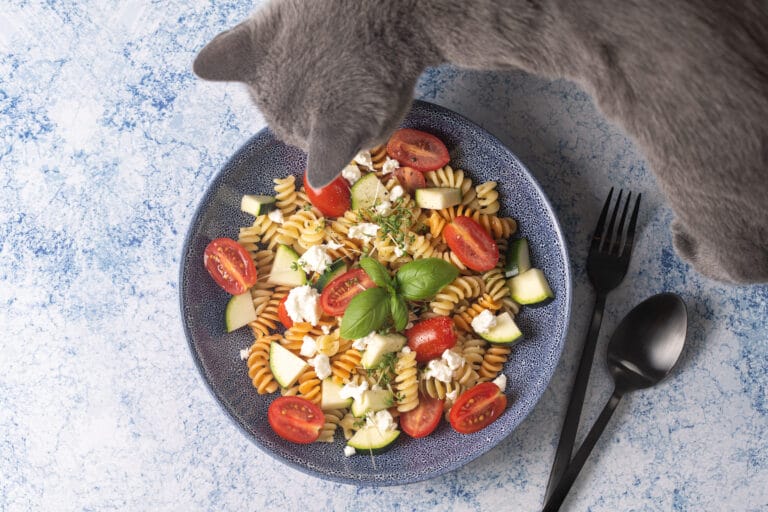Can Cats Eat Pesto? If you’re wondering this while slathering this sauce over a sandwich, for example, you’re not alone. Or if your cat is sitting on your plate of pesto-covered pasta. Her imploring meows and wide eyes could be very alluring.

Navigating the World of Feline Cuisine: Can Cats Eat Pesto?
Introduction
Pesto, with its aromatic blend of fresh herbs, garlic, nuts, and cheese, has become a beloved culinary delight for many. Its vibrant flavors and versatility make it a popular addition to various dishes. However, as a responsible cat owner, you may be wondering whether this flavorful creation is safe for your feline companion. Can cats eat pesto? In this article, we will delve into the ingredients of pesto, explore its potential effects on cats, and provide insights into whether it can be a part of your cat’s diet.
Can Cats Eat Pesto?
From a scientific standpoint, cats are not recommended to consume pesto or any foods containing its ingredients. While individual ingredients in pesto may not be overtly toxic to cats, the combination and concentration of these ingredients can potentially lead to digestive issues and discomfort in felines.
Toxic Ingredients in Pesto
Pesto typically contains ingredients such as garlic and certain types of nuts, both of which can pose risks to cats. Garlic, a member of the Allium family, can be toxic to cats and dogs. It contains compounds that can damage red blood cells and lead to a condition called hemolytic anemia. Additionally, certain nuts, such as macadamia nuts, are known to be toxic to dogs and should also be avoided in feline diets.
Is Pesto Poisonous to Cats?
While the individual ingredients in pesto may be safe for humans, they are not necessarily suitable for cats. Garlic, in particular, is a concern due to its potential to cause serious health issues in felines. The concentrated nature of pesto and the presence of garlic make it a less-than-ideal choice for including in your cat’s diet.

Benefits of Pesto to Cats
Pesto does not offer any specific benefits to cats. Cats have specific dietary requirements that are centered around animal-based proteins. The ingredients in pesto, such as herbs and nuts, do not align with these requirements and are unlikely to contribute positively to a cat’s health.
How Much Pesto Can Cats Eat?
Given the potential risks associated with the ingredients in pesto, it is recommended to avoid offering it to your cat altogether. Garlic, in even small amounts, can have adverse effects on cats’ health, and nuts are not a necessary or suitable component of a feline diet.
Alternatives and Supplements
Instead of considering pesto for your cat, focus on providing them with nutritionally balanced cat food that meets their specific dietary needs. High-quality commercial cat food is formulated to provide the essential nutrients cats need for their overall well-being.

FAQ
Can Cats Eat Pesto?
No, cats should not consume pesto due to its potentially toxic ingredients, such as garlic.
Should I Consult a Vet Before Feeding Pesto to My Cat?
Yes, it’s recommended to consult your veterinarian before introducing any new food to your cat’s diet to ensure their safety and well-being.
What Are Symptoms of Pesto Poisoning in Cats?
Symptoms of poisoning from garlic or toxic nuts in pesto may include vomiting, diarrhea, lethargy, and potential damage to red blood cells.
How Can I Introduce Pesto to Cats?
Introducing pesto to your cat’s diet is not advised due to the potential risks associated with its ingredients.
Conclusion
When considering whether cats can eat pesto, prioritize your feline companion’s health and well-being. While some ingredients in pesto may be safe for humans, they are not suitable for cats, especially garlic and certain nuts. Instead of taking risks with potentially harmful foods, offer your cat a balanced diet that is specially formulated to meet their nutritional needs. Consult your veterinarian for guidance on providing the best nutrition for your cat’s optimal health and happiness.
By Cat Food Site – The Pages provides nutrition information for your cat.

